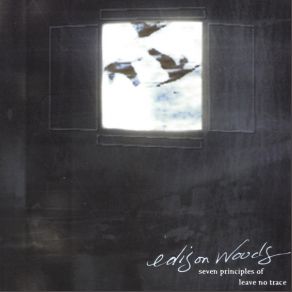7 Principles of Leave No Trace
Download links and information about 7 Principles of Leave No Trace by EDISON WOODS. This album was released in 2003 and it belongs to Jazz, Rock, Pop, Alternative genres. It contains 9 tracks with total duration of 45:34 minutes.

|
|
|---|---|
| Artist: | EDISON WOODS |
| Release date: | 2003 |
| Genre: | Jazz, Rock, Pop, Alternative |
| Tracks: | 9 |
| Duration: | 45:34 |
| Buy it NOW at: | |
| Buy on iTunes $8.91 | |
Tracks
[Edit]| No. | Title | Length |
|---|---|---|
| 1. | Secrets | 5:11 |
| 2. | Muted Thunderstorms | 5:37 |
| 3. | Rio Abajo Rio | 3:23 |
| 4. | Like a Jewel | 4:00 |
| 5. | Was He a Poet | 7:58 |
| 6. | Shirts for Pennies | 4:24 |
| 7. | Fiction | 5:50 |
| 8. | Seven Principles of Leave No Trace | 5:29 |
| 9. | Brooklyn Flowers | 3:42 |
Details
[Edit]Unapologetically, and even stridently, Edison Woods from New York are that rarest of enigmas: a band that functions equally well as a performance art project and that creates installations, utilizing its membership like a collective rather than as a fixed entity. Fronted by principal songwriter and keyboardist Julia Frodahl, this septet's year 2000 self-titled debut album on Canada's Endearing Records label, rippled the indie pond with its moody grace and sensual soundscapes. This second effort is on Germany's awesome Glitterhouse imprint. Its title, Seven Principles of Leave No Trace, loosely references Buddhist dharma; and as a full-length recording, it offers a more wide open view of the band's sound; the guitars are less dominant, the strings and keyboards — acoustic and Rhodes pianos, mellotrons, primitive synths, etc. — predominantly dress these nine shimmering, haunted, songs with a kind of solitary elegance that is at once sophisticated, dynamic, and full of seamless dynamic tension. The album's chromatic palette is purposely limited, and creates a spectral, textural schema where the protagonist, delivering song lyrics that are as poetic as they are rooted in all that lies beneath the surface of relativism and outward perception, is de-centered by and in the music itself. This is music that reflects the outward breath, the one exhaled by an individual that dissolves herself as she exhales, into the emptiness and interconnectedness of an undefined, limitless universe. A case in point is "Was He A Poet," with its stark, fragmentary lines, it seems to question the protagonist's intent in asking as much as it seeks the answer to the question in the title. Frodahl's delivery states, "I should have known..." but clearly she is only semi-convinced she does now. The sound of sobbing echoes in the backdrop, though it's an instrumental, not human, voice that creates the effect, like the unconsciously audible speaking. A slightly out of tune upright piano and a tapped cello bow usher in "Shirts For Pennies," an ambiguous poem where guitars and strings caress the singer after she offers her questions while admitting her brokenness as the absence of the Beloved haunts her present tense: "And I wish I had your heart/it's enough to make me hand mine over. . . ." The album closes with "Brooklyn Flowers." Frodahl's piano and voice are accompanied only by Simon Wolfisch's cello, and a guitar played by Simon Raymonde (formerly of the Cocteau Twins). The track begins with her singing a cappella the words, "Lover Man," echoing Billie Holiday for a fraction of a second before the piano and guitar enter and she finishes the line: "...I won't let you go now/Before I make you a bouquet of wild Brooklyn flowers. Ambient sounds haunt the periphery of the cut as Frodahl slowly offers a view of love as something darkly transformational. It's as if her protagonist can sing from the other side of passion, once the darkness has done its work and obliterated the individual who serves love for its own or the sake of the Other now — though the Beloved is consumed with love for someone else. Her voice comes so near to breaking under the weight of this change, the listener has to hold her breath for a moment, seemingly to buoy the singer through this gorgeous yet tenderly violent moment of reckoning. It's a gloriously vulnerable way to end an album to be sure. But in the giving away of everything, as these voices do again and again throughout this recording, Seven Principles of Leave No Trace stands resiliently, naked and tall, as a deeply moving and redemptive work or art.